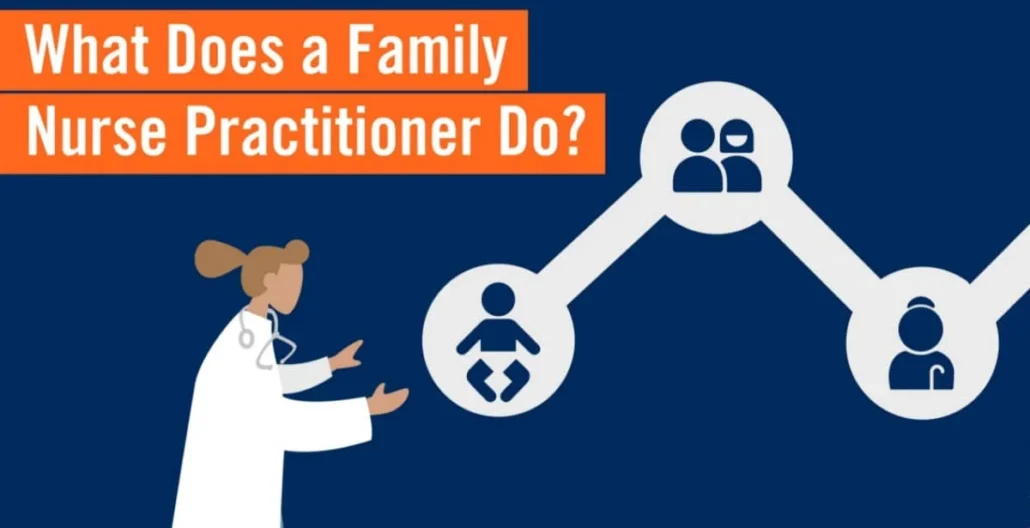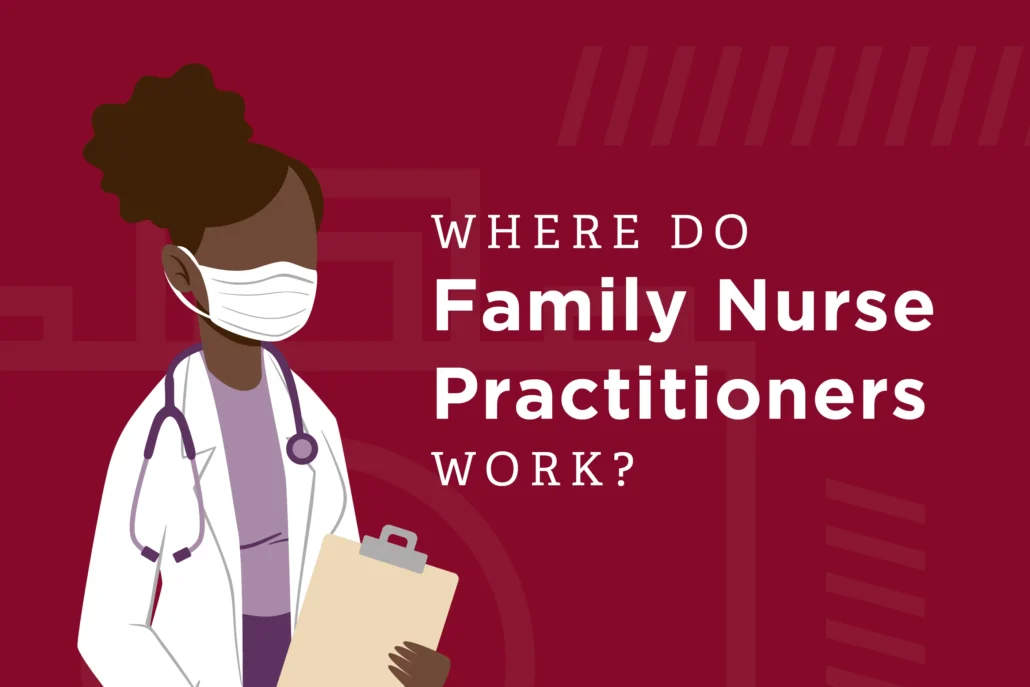Discover the role and responsibilities of a Family Nurse Practitioner (FNP) in this comprehensive article. Explore the educational journey, certification requirements, career outlook, and advantages/disadvantages of pursuing this rewarding healthcare profession. Learn about top FNP programs and find out how FNPs transition to other nursing positions. Uncover the demand for FNPs and compare their roles to other advanced nursing positions. If you’re considering a career in healthcare, this article is your ultimate guide to becoming a Family Nurse Practitioner.
Who is a Family Nurse Practitioner (FNP)?

A Family Nurse Practitioner (FNP) is an advanced practice registered nurse (APRN) specializing in family-centered care. FNPs are trained to assess, diagnose, and treat various health conditions across all age groups. They work collaboratively with physicians and other healthcare professionals to deliver holistic and patient-centered care.
How Long Does it Take to Become a Family Nurse Practitioner (FNP)?
Becoming a Family Nurse Practitioner typically requires a time investment of 6 to 8 years. This includes earning a Bachelor of Science in Nursing (BSN), obtaining a Master of Science in Nursing (MSN) with a focus on family practice, and accruing clinical experience. Some accelerated programs may shorten this timeframe, offering a quicker path for those with prior nursing experience.
What Does a Family Nurse Practitioner (FNP) Do?

Family Nurse Practitioners are trained to provide a wide array of healthcare services, including conducting physical exams, ordering diagnostic tests, managing chronic conditions, and prescribing medications. They emphasize preventive care and health education, fostering long-term patient relationships.
How to Become a Family Nurse Practitioner (FNP)?
To become an FNP, one must follow a structured educational path. This involves completing a BSN, obtaining an MSN with a focus on family nursing, and gaining clinical experience. Certification from a recognized nursing body is also required, usually through organizations like the American Nurses Credentialing Center (ANCC) or the American Academy of Nurse Practitioners Certification Board (AANPCB).
Educational Requirements for Family Nurse Practitioner (FNP)
Educational requirements for FNPs include a BSN and an MSN with a specialization in family nursing. Some programs may admit registered nurses with an associate degree or diploma in nursing, provided they complete a bridge program to earn a BSN.
Family Nurse Practitioner (FNP) Certification and Exam Requirements
FNPs must obtain certification through a recognized nursing board, requiring successful completion of a certification exam. The exams, such as those offered by the ANCC or AANPCB, assess the nurse’s knowledge and competency in family nursing practice.
Where Do Family Nurse Practitioners (FNPs) Work?

Family Nurse Practitioners work in various healthcare settings, including primary care clinics, hospitals, community health centers, and private practices. They may also collaborate with specialty providers, contributing to comprehensive patient care.
What Is the Family Nurse Practitioner (FNP) Career Outlook and Career Growth?
The career outlook for FNPs is promising, with a growing demand for primary care providers. FNPs can experience career growth by specializing in areas such as pediatrics, geriatrics, or women’s health, or by pursuing leadership roles in healthcare organizations.
What Are the Qualities of a Family Nurse Practitioner (FNP)?
- Compassion and Empathy: One of the foundational qualities of an FNP is a genuine sense of compassion and empathy. FNPs understand the physical and emotional aspects of patient care, creating a supportive and empathetic environment that fosters trust between healthcare provider and patient.
- Effective Communication Skills: Clear and effective communication is essential in healthcare, and FNPs excel in conveying complex medical information in a way that patients can understand. Strong communication skills also facilitate collaboration with other members of the healthcare team.
- Critical Thinking and Problem-Solving: FNPs are adept at critical thinking and quick decision-making. They analyze complex situations, assess patient needs, and formulate appropriate treatment plans. This ability is crucial for addressing the diverse healthcare challenges presented by patients across the lifespan.
- Adaptability: Healthcare is an ever-evolving field, and FNPs need to be adaptable to changes in technology, medical guidelines, and healthcare policies. Their ability to embrace change ensures that they stay current with advancements in healthcare delivery.
- Autonomy and Initiative: FNPs often work independently, making autonomy and initiative important qualities. They take the lead in patient care, making decisions that align with their expertise and the best interests of their patients. This autonomy is balanced with collaboration when needed.
- Commitment to Lifelong Learning: The field of healthcare is dynamic, with continuous advancements in medical knowledge and technology. FNPs exhibit a commitment to lifelong learning, staying updated on the latest research, treatment modalities, and healthcare trends to provide the best possible care.
- Team Collaboration: While FNPs can work independently, they also recognize the importance of collaboration within the healthcare team. They communicate effectively with physicians, nurses, and other healthcare professionals to ensure holistic and coordinated patient care.
- Cultural Competence: Given the diverse patient populations FNPs serve, cultural competence is crucial. FNPs respect and understand the cultural backgrounds, beliefs, and values of their patients, promoting culturally sensitive care and improving health outcomes.
- Integrity and Professionalism: FNPs adhere to high ethical standards, maintaining integrity in their interactions with patients, families, and colleagues. Professionalism is demonstrated through a commitment to confidentiality, honesty, and ethical decision-making.
- Leadership Skills: In various healthcare settings, FNPs may take on leadership roles. Leadership skills enable them to influence positive change, advocate for their patients, and contribute to the advancement of healthcare policies and practices.
- Patience and Tolerance: Healthcare encounters can be challenging, and FNPs demonstrate patience and tolerance. They understand the complexities of healthcare and remain calm and composed when faced with difficult situations.
- Focus on Preventive Care: Preventive care is a cornerstone of the FNP role. FNPs emphasize health promotion and disease prevention, encouraging patients to adopt healthy lifestyles and participate in screenings and vaccinations.
What Are the Top Family Nurse Practitioner (FNP) Programs?
Several reputable institutions offer top-notch FNP programs, including Johns Hopkins University, University of Pennsylvania, and Duke University. Program rankings often consider factors such as faculty expertise, clinical opportunities, and accreditation.
Are There Any Online Programs to Become a Family Nurse Practitioner (FNP)?
Yes, many accredited institutions offer online FNP programs, providing flexibility for working nurses. These programs typically include online coursework and on-site clinical experiences, allowing students to balance academic and professional commitments.
What Is the Salary of a Family Nurse Practitioner (FNP)?
As of 2023, the median annual salary for Family Nurse Practitioners in the United States is around $115,800. Salaries may vary based on factors such as experience, location, and the specific healthcare setting.
What Is the Difference Between a Family Nurse Practitioner and a Clinical Nurse Specialist?
While both roles involve advanced nursing practice, Family Nurse Practitioners focus on providing direct patient care, including diagnosis and treatment. Clinical Nurse Specialists, on the other hand, specialize in a specific patient population or healthcare setting, often taking on roles in education, research, and leadership.
How Do Family Nurse Practitioners (FNPs) Transition to Other Nursing Positions?
Family Nurse Practitioners can transition to other nursing positions by acquiring additional certifications, pursuing further education, or specializing in a different area of nursing. This flexibility allows FNPs to adapt their careers to evolving healthcare needs.
5 Advantages to Becoming a Family Nurse Practitioner and 5 Disadvantages to Becoming a Family Nurse Practitioner
Advantages to Becoming a Family Nurse Practitioner (FNP):
- Diverse Career Opportunities: Becoming an FNP opens up a wide range of career opportunities. FNPs can work in various healthcare settings, including primary care clinics, hospitals, community health centers, and specialty practices. The versatility of their skills allows them to adapt to different patient populations and healthcare needs.
- Autonomy in Practice: FNPs often enjoy a high level of autonomy in their practice. They can diagnose and treat a variety of health conditions, prescribe medications, and provide preventive care without constant supervision. This autonomy allows them to make independent decisions and play a central role in patient care.
- Competitive Salary: Family Nurse Practitioners generally receive competitive salaries. The advanced education and clinical training required for this role, combined with the increasing demand for primary care providers, contribute to FNPs earning salaries that often surpass those of registered nurses.
- Positive Impact on Patient Outcomes: FNPs have the opportunity to build long-term relationships with their patients, fostering continuity of care. By emphasizing preventive care and health education, FNPs contribute to positive health outcomes and help patients manage chronic conditions effectively.
- Opportunity for Specialization: FNPs can choose to specialize in areas such as pediatrics, geriatrics, women’s health, or acute care. This specialization allows them to tailor their practice to specific patient populations or healthcare needs, enhancing their expertise and career satisfaction.
Disadvantages to Becoming a Family Nurse Practitioner (FNP):
- Intense Educational Requirements: The educational path to becoming an FNP is demanding, typically requiring a Bachelor of Science in Nursing (BSN) followed by a Master of Science in Nursing (MSN) with a specialization in family nursing. This can be a lengthy and challenging process, especially for those balancing work and family commitments.
- Regulatory Variations by State: The scope of practice for FNPs can vary from state to state due to different regulatory frameworks. Navigating these variations and staying compliant with state-specific requirements can be complex, impacting the ability to practice autonomously in some regions.
- Potential for High-Stress Situations: Like many healthcare professionals, FNPs may encounter high-stress situations. Balancing the demands of patient care, administrative responsibilities, and the emotional aspects of healthcare can be challenging and may contribute to job-related stress.
- Limited Work-Life Balance: FNPs, especially in busy healthcare settings, may experience challenges in achieving a satisfactory work-life balance. The demands of patient care, administrative tasks, and the need for continuous education can lead to long work hours and potential burnout.
- Constant Need for Continuing Education: The field of healthcare is dynamic, and FNPs must commit to ongoing education to stay current with evolving medical knowledge and best practices. Keeping up with continuing education requirements can be time-consuming and may pose challenges for those with busy schedules.
Family Nurse Practitioner (FNP) Roles and Responsibilities
a. Primary Care Provider:
- Assessment: Conduct thorough health assessments, including physical exams, medical histories, and diagnostic tests, to identify health issues and risk factors.
- Diagnosis and Treatment: Diagnose and treat common acute and chronic health conditions, prescribing medications and developing care plans to address patients’ needs.
b. Health Promotion and Disease Prevention:
- Educate Patients: Provide health education and counseling to individuals and families, emphasizing preventive measures and lifestyle modifications to promote overall well-being.
- Screenings and Vaccinations: Conduct screenings, immunizations, and health maintenance interventions to prevent and detect health problems early.
c. Collaborative Care:
- Interdisciplinary Collaboration: Collaborate with physicians, nurses, pharmacists, and other healthcare professionals to ensure coordinated and holistic patient care.
- Referrals: Make appropriate referrals to specialists when necessary, facilitating continuity of care for patients with complex health conditions.
d. Chronic Disease Management:
- Manage Chronic Conditions: Monitor and manage chronic illnesses, such as diabetes, hypertension, and respiratory conditions, through ongoing assessment, medication management, and patient education.
e. Prescriptive Authority:
- Prescribe Medications: Prescribe medications and therapies within their scope of practice, considering patient needs, safety, and potential interactions.
f. Patient Advocacy:
- Advocate for Patients: Serve as advocates for patients, ensuring their voices are heard and their healthcare preferences are respected within the healthcare system.
What’s the Demand for Family Nurse Practitioners?

The demand for Family Nurse Practitioners is on the rise, driven by factors such as an aging population, increased emphasis on preventive care, and healthcare policy changes. This demand is expected to continue growing, creating ample job opportunities for FNPs.
Conclusion
Becoming a Family Nurse Practitioner is a rewarding journey that involves rigorous education, clinical experience, and dedication to patient care. FNPs play a crucial role in addressing the increasing demand for primary care providers and contribute significantly to improving the overall health of communities. With a positive career outlook, diverse opportunities for specialization, and the ability to make a meaningful impact on patient lives, the path to becoming a Family Nurse Practitioner is a fulfilling and promising choice in the healthcare field.
Frequently Asked Questions
1. What’s the difference between FNP vs NP?
The term “Nurse Practitioner (NP)” is a broad category that includes various specializations, and “Family Nurse Practitioner (FNP)” is one of those specializations. While FNPs focus on family-centered care across the lifespan, other NPs may specialize in areas like pediatrics, geriatrics, or women’s health. So, FNP is a specific type of NP with a focus on family care.
2. Can a Family Nurse Practitioner (FNP) work in a hospital?
Yes, FNPs can work in hospitals. They are versatile healthcare professionals and may practice in various settings, including hospitals, providing primary care, managing chronic conditions, and collaborating with other healthcare professionals to ensure comprehensive patient care.
3. Can a Family Nurse Practitioner (FNP) write prescriptions?
Yes, FNPs have prescriptive authority. They are authorized to write prescriptions for medications, including those for managing acute and chronic health conditions. This authority is granted based on their advanced education, clinical training, and certification.
4. Can FNPs Specialize?
Yes, FNPs have the opportunity to specialize within the broader family care context. They can pursue additional certifications or training to specialize in areas such as pediatrics, geriatrics, women’s health, or acute care. Specialization allows FNPs to focus on specific patient populations or healthcare needs.
5. What is the qualification of a family nurse practitioner?
The educational qualification for a Family Nurse Practitioner typically includes:
- Completion of a Bachelor of Science in Nursing (BSN) degree.
- Licensure as a Registered Nurse (RN) after passing the NCLEX-RN exam.
- Completion of a Master of Science in Nursing (MSN) or a Doctor of Nursing Practice (DNP) with a specialization in family nursing.
- Certification as a Family Nurse Practitioner through an accredited certifying body, such as the American Nurses Credentialing Center (ANCC) or the American Academy of Nurse Practitioners Certification Board (AANPCB).
- Clinical experience during the graduate program, and the completion of a specified number of clinical hours.
- State licensure to practice as an FNP, which may have specific requirements depending on the state.

 Add Instructions
Add Instructions